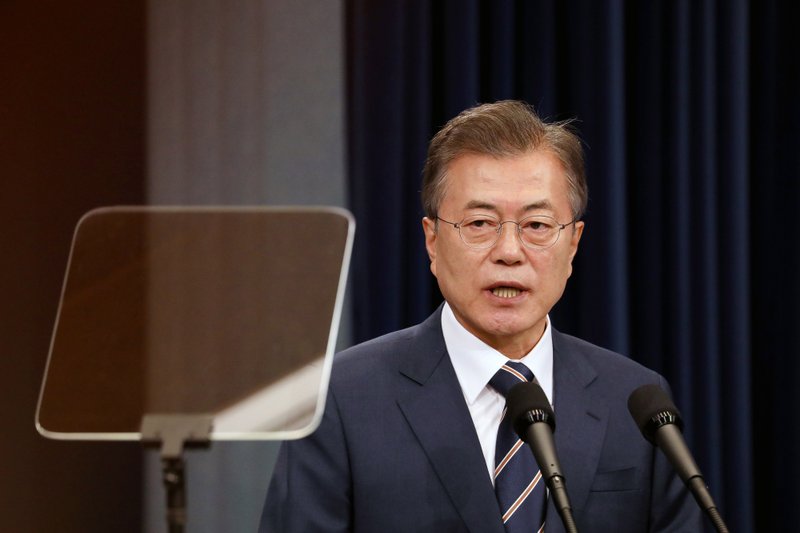TOKYO -- South Korean President Moon Jae-in pledged Wednesday to establish road and rail links with North Korea soon, as a first step toward the sort of regional economic integration that Europe established after World War II.
Moon will travel to Pyongyang next month for his third meeting this year with North Korean leader Kim Jong Un, and he pledged that the two would take an "audacious step" toward the signing of a peace treaty and the complete denuclearization of the Korean Peninsula.
Moon spoke during a ceremony to mark the 73rd anniversary of the liberation of the Korean Peninsula from Japanese colonial rule. He said good relations between the two Koreas would be the "driving force " toward the denuclearization of the peninsula.
He also said he wants to see groundbreaking ceremonies before the end of this year to establish road and rail links between the two Koreas, links that would cross what is currently one of the world's most heavily militarized borders.
[NUCLEAR NORTH KOREA: Maps, data on country’s nuclear program]
"The reconnection of railroads and roads is the beginning of mutual prosperity on the Korean Peninsula," Moon said.
That in turn could pave the way for an East Asian Railroad Community, encompassing six Northeast Asian countries and the United States, he said. Although he did not specify the countries, it is likely to mean both Koreas, China, Russia, Japan and Mongolia.
"The community will expand the horizon of the Korean economy to the northern part of the continent and become the main artery of mutual prosperity in Northeast Asia," Moon said. "It will then lead to the creation of East Asian energy and economic communities. Moreover, it will initiate a Northeast Asian multilateral peace and security system."
Moon compared this initiative to the gradually expanding ties that Europe instituted after World War II, starting with a six-nation coal and steel community and eventually culminating in the European Union.
"When peace is established on the Korean Peninsula along with complete denuclearization, economic cooperation can be carried out in earnest," he said. "When the dreams of a peace-based economy and economic community are realized, our economy can take a new leap forward."
He also proposed the establishment of "special unification economic zones" in border regions.
Separately, President Donald Trump's administration announced new sanctions Wednesday against three organizations and an individual accused of facilitating shipments to North Korea in violation of sanctions, keeping pressure on Kim's government amid ongoing negotiations over the dismantling of his nuclear program.
The companies targeted by the Treasury Department are based in China, Singapore and Russia. The shipments, which violate sanctions imposed by the United States and the United Nations, include exports of alcohol, tobacco and cigarette products, as well as refined oil products.
"Treasury will continue to implement existing sanctions on North Korea, and will take action to block and designate companies, ports, and vessels that facilitate illicit shipments and provide revenue streams to the DPRK," Steven Mnuchin, the Treasury secretary, said in a statement, using initials for North Korea's official name.
"The tactics that these entities based in China, Singapore, and Russia are using to attempt to evade sanctions are prohibited under U.S. law, and all facets of the shipping industry have a responsibility to abide by them or expose themselves to serious risks," Mnuchin said.
He added: "Consequences for violating these sanctions will remain in place until we have achieved the final, fully verified denuclearization of North Korea."
The Treasury Department said that the China-based Dalian Sun Moon Star International Logistics Trading Co. and SINSMS Pte. Ltd., its affiliate in Singapore, used falsified shipping documents to export products to North Korea.
Information for this article was contributed by Simon Denyer and Min Joo Kim of The Washington Post; and by Alan Rappeport of The New York Times.
RELATED ARTICLE
http://www.arkansas…">Women seen in VX attack face a trial
A Section on 08/16/2018

